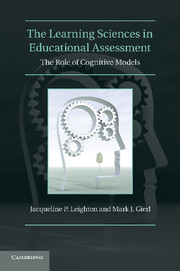Book contents
- Frontmatter
- Contents
- 1 The Learning Sciences in Educational Assessment: An Introduction
- 2 Evaluating Cognitive Models in Large-Scale Educational Assessments
- 3 Cognitive Models of Task Performance for Reading Comprehension
- 4 Cognitive Models of Task Performance for Scientific Reasoning and Discovery
- 5 Cognitive Models of Task Performance for Mathematical Reasoning
- 6 Putting It All Together: Cognitive Models to Inform the Design and Development of Large-Scale Educational Assessment
- 7 Cognitively Based Statistical Methods – Technical Illustrations
- Index
- References
2 - Evaluating Cognitive Models in Large-Scale Educational Assessments
Published online by Cambridge University Press: 05 June 2012
- Frontmatter
- Contents
- 1 The Learning Sciences in Educational Assessment: An Introduction
- 2 Evaluating Cognitive Models in Large-Scale Educational Assessments
- 3 Cognitive Models of Task Performance for Reading Comprehension
- 4 Cognitive Models of Task Performance for Scientific Reasoning and Discovery
- 5 Cognitive Models of Task Performance for Mathematical Reasoning
- 6 Putting It All Together: Cognitive Models to Inform the Design and Development of Large-Scale Educational Assessment
- 7 Cognitively Based Statistical Methods – Technical Illustrations
- Index
- References
Summary
In educational assessment, an idea whose time has come is that tests can be designed according to advances in the learning sciences. Currently, researchers and practitioners are studying how learning science outcomes can inform the design, development, and use of large-scale educational assessments. To date, however, there are few examples of large-scale educational tests designed from a learning science perspective and, hence, few empirical studies exist to evaluate the strengths and weaknesses of this approach. Moreover, developing the first generation of assessments using outcomes from the learning sciences is hampered by the limited information available on the types of cognitive models that can facilitate the design, validation, and administration of educational tests. Yet the role of cognitive models is paramount to the success of this endeavor. The National Research Council (NRC, 2001) asserted in their seminal publication, Knowing What Students Know: The Science and Design of Educational Assessments, that cognitive models have a foundational role in educational assessment that is currently poorly developed and under-valued:
A model of cognition and learning, or a description of how people represent knowledge and develop competence in a subject domain, is a cornerstone of the assessment development enterprise. Unfortunately, the model of learning is not made explicit in most assessment development efforts, is not empirically derived, and/or is impoverished relative to what it could be. (p. 176)
Information
- Type
- Chapter
- Information
- The Learning Sciences in Educational AssessmentThe Role of Cognitive Models, pp. 45 - 70Publisher: Cambridge University PressPrint publication year: 2011
